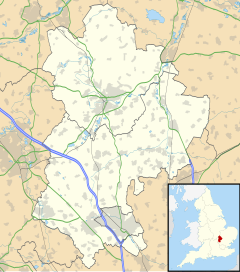Farndish
| Farndish | |
|---|---|
 Farndish church |
|
| Farndish shown within Bedfordshire | |
| Population | 40 (2001) |
| OS grid reference | SP925635 |
| Civil parish | |
| Unitary authority | |
| Ceremonial county | |
| Region | |
| Country | England |
| Sovereign state | United Kingdom |
| Post town | NORTHAMPTON |
| Postcode district | NN29 |
| Dialling code | 01933 |
| Police | Bedfordshire |
| Fire | Bedfordshire and Luton |
| Ambulance | East of England |
| EU Parliament | East of England |
| UK Parliament | |
Farndish is a very small and rural village in northwest Bedfordshire, located about 500 metres east of the county border with Northamptonshire. The village is near the Northamptonshire villages of Irchester and Wollaston and the Bedfordshire village of Wymington. The name Farndish means fern-clad pasture. It is in the civil parish of Podington.
Although previously a parish itself, today Farndish is within the civil parish of Podington (sometimes called Podington and Hinwick), and part of the electoral ward of Harrold in the Borough of Bedford. Much property in the area is owned by – once famous locally for their pork pies and pastry.
Farndish was mentioned in the Domesday Survey as 'Fernadis'.
According to Samuel Lewis
The local author H. E. Bates often would come through the village on his nocturnal walks in the 1920s and 1930s. It was on one of the night walks that he got the inspiration for his first novel, The Two Sisters, when he saw a light burning in one of the cottage windows.
In 1937 The Times reported the plans being made in Farndish to mark the celebrations for the Coronation of King George VI – "a fine example of how England's villages may make this a memorable day in the lives of their people". On Coronation Day each of the twelve houses in the village was to be decorated to represent a different part of the British Empire. In the morning there would be a service in the parish church, for which the parson would come from Podington. "Then", according to The Times, "the population of 45 will adjourn to the village hall to drink the health of the King in ale. Port wine will be supplied to those who are teetotallers, in accordance with a well-known English custom." In the afternoon there were to be sports and games, and in the evening the villagers would return to the village hall for a fancy-dress dance and whist drive.
...
Wikipedia

